Edited by Julia Myers
Over the past year, the geopolitical landscape has changed rapidly. We have seen a shift in the international order away from American global hegemony to a rising China and powerful regional actors. While COVID caused massive upsets to globalization trends and increased social unrest, we've seen the world come together to combat climate change. Geopolitics has become increasingly more dynamic and unpredictable, and as a result, it is critical that companies monitor geopolitical risk to develop proactive, not reactive, responses to change.
According to an EY survey of global executives conducted this year, c-suite confidence in their companies' ability to manage geopolitical risk has dropped 9% (from 69% in 2020 to 60% in 2021). 94% of companies in the survey also noted that they experienced unexpected impacts from political risk. In order to improve their political risk identification and monitoring, executives and their teams should consider utilizing alternative data sources as an early warning system, such as the platform NWO.ai developed which monitors global trends, assisting leaders in planning ahead in a changing geopolitical climate.
I'm excited to introduce NWO.ai's list of the top geopolitical trends for 2022, and while this list is not exhaustive, these trends are bound to impact next year’s political climate. Keep an eye out for updates as we revisit NWO.ai's forecast throughout next year and continue to measure the impact of these trends.
1. United States Foreign Policy Realignment
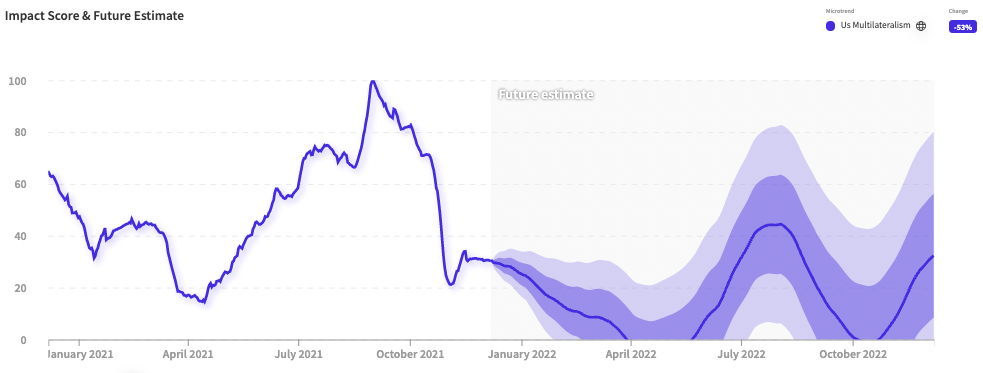
After 20 years of war in the Middle East, the United States is undergoing a "Strategic Contraction," to use a term by India's external affairs minister, Subrahmanyam Jaishankar. "Strategic Contraction" describes how the US will continue to dominate the global power hierarchy while recognizing that it cannot tackle the biggest problems alone and needs to seek out collaboration between international partners. A few different examples include Biden's renewed commitment to working with the international community to tackle climate change and the US recalibrating its role in the Middle East and Europe.
NWO.ai's signal for "US Multilateralism" is showing continued growth, having recently peaked in September 2021. The US will look to reprioritize its focus on containing a more resilient China, as evident with this year's Quad meeting and the US's recent nuclear submarine deal with Australia.
2. Democratic Backsliding
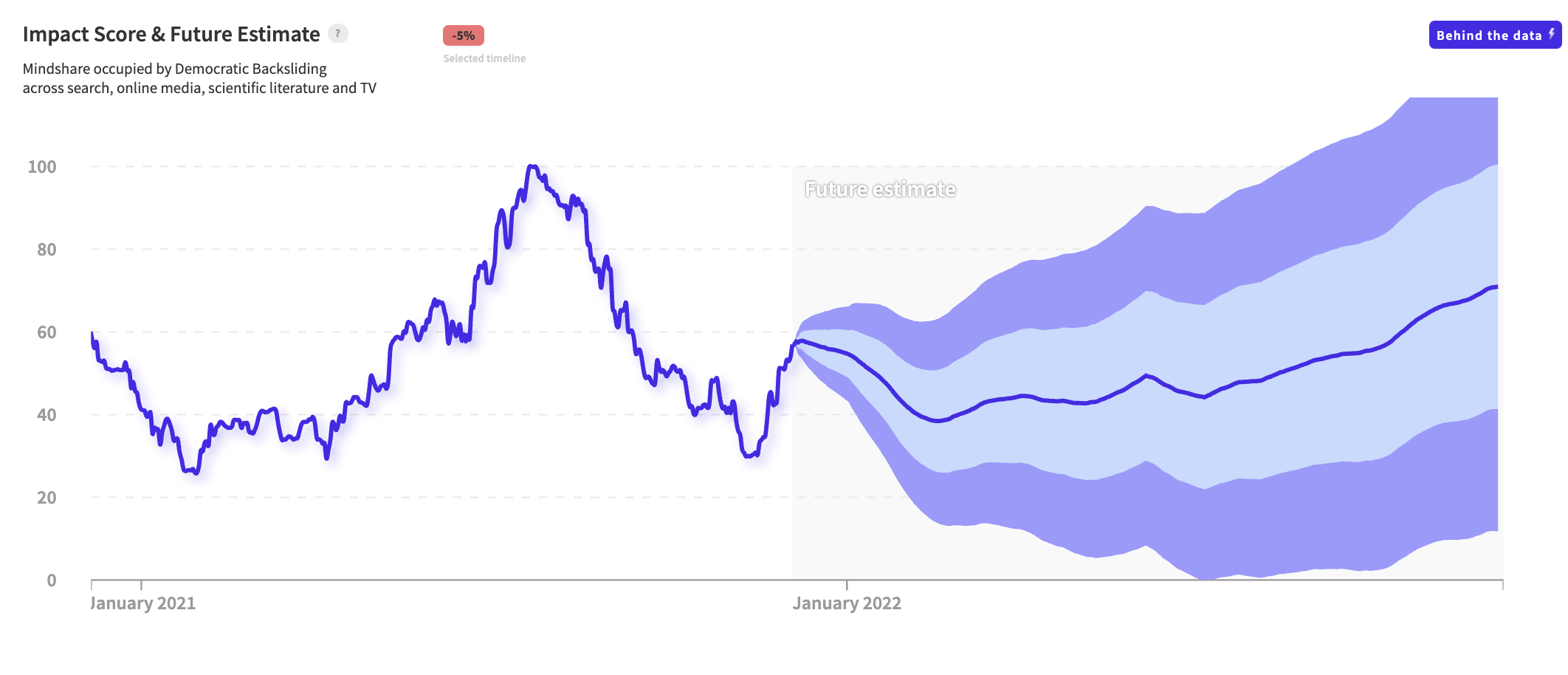
According to Freedom House, nearly 75% of the global population lives in a country that has seen a decrease in its democracy score over the past year. In 2020 the number of countries that Freedom House classified as "free" was at its lowest levels since 2005, while the number of countries that classified as "not free" reached its highest level during the same time period. These trends are expected to continue globally as governments take advantage of COVID-19 to exert more executive power. Some of the most notable countries that have seen their Freedom Score decrease include India, China, the Philippines, and now even the United States. In response to these alarming trends, the United States held a summit for democracy last week, in part to help frame the current geopolitical dynamics as a competition between democracy vs. autocracy.
According to NWO.ai's signal, democratic backsliding will continue to trend into next year. The implications for global democratic backsliding are dire, as governments potentially tighten control over media, civil liberties, and free trade.
3. Pink Tide 2.0
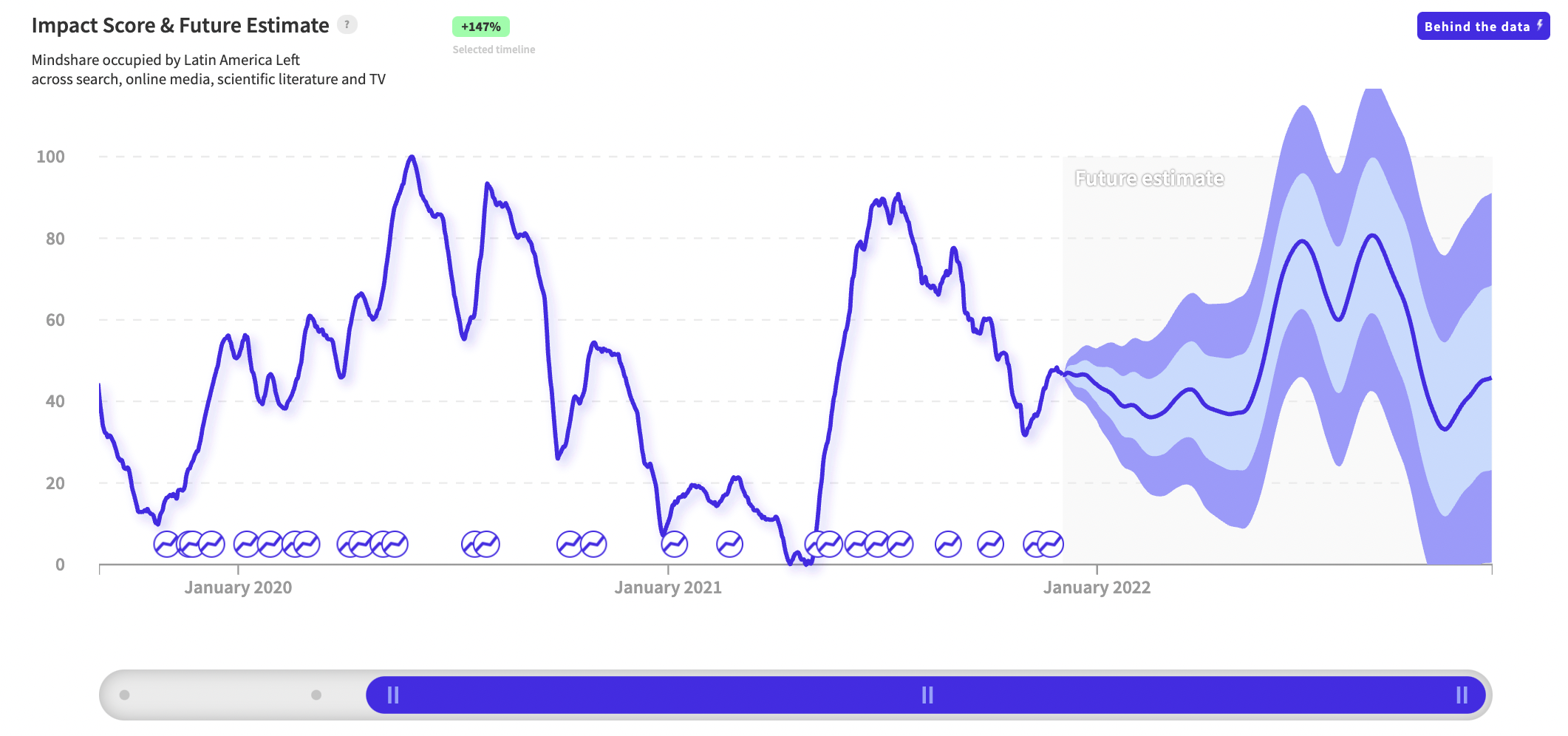
A second pink tide in Latin America? The pink tide, a term describing the rapid rise to power of a number of left-wing governments in Latin America during the 2000s, has been reversing over the past 10 years. However, the political landscape is shifting once again in favor of the left, with the 2018 election of Andres Manuel Lopez Obrador (AMLO) in Mexico, the 2020 election of Luis Arce in Bolivia, the May 2021 election of a left-leaning Constitutional Convention in Chile, and the most recent election in November of Honduran leftist presidential candidate Xiomara Castro. Upcoming presidential elections in Brazil and Colombia in 2022 feature left-leaning candidates leading in the polls. While the economic and political situations are unique to each country, people across the region are demanding their governments address rising inequality, increase the standard of living and focus on crime and corruption.
The trend for "Latin America Left" is expected to tick up in July 2022 as a result of increased chatter and interest in these left-wing candidates. NWO.ai will be monitoring the electoral outcomes and policy decisions these governments make.
4. The Continued Fight Against Mutations
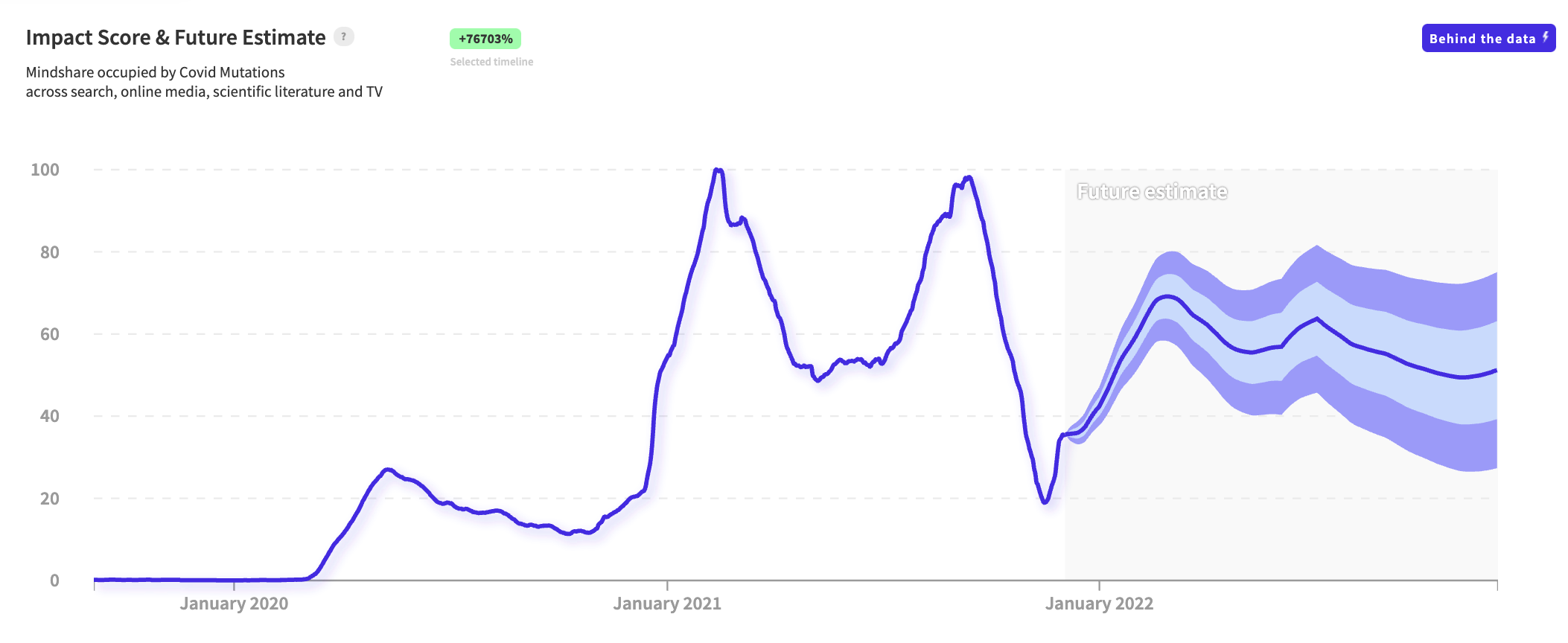
If the Omicron variant is any indication, the threats from a new COVID-19 variant/mutation will continue to be an albatross for global governments. The signal for "COVID Mutations" is expected to continue growing into 2022. The appetite for additional lockdowns and restrictions is simply lacking in Western countries, so governments will have to double down on vaccination efforts and improve COVID-19 treatment. While many in the developed world have been able to access COVID-19 vaccines, there is still lagging inequity in vaccine distribution and logistic capabilities between developed and developing countries, particularly in Africa.
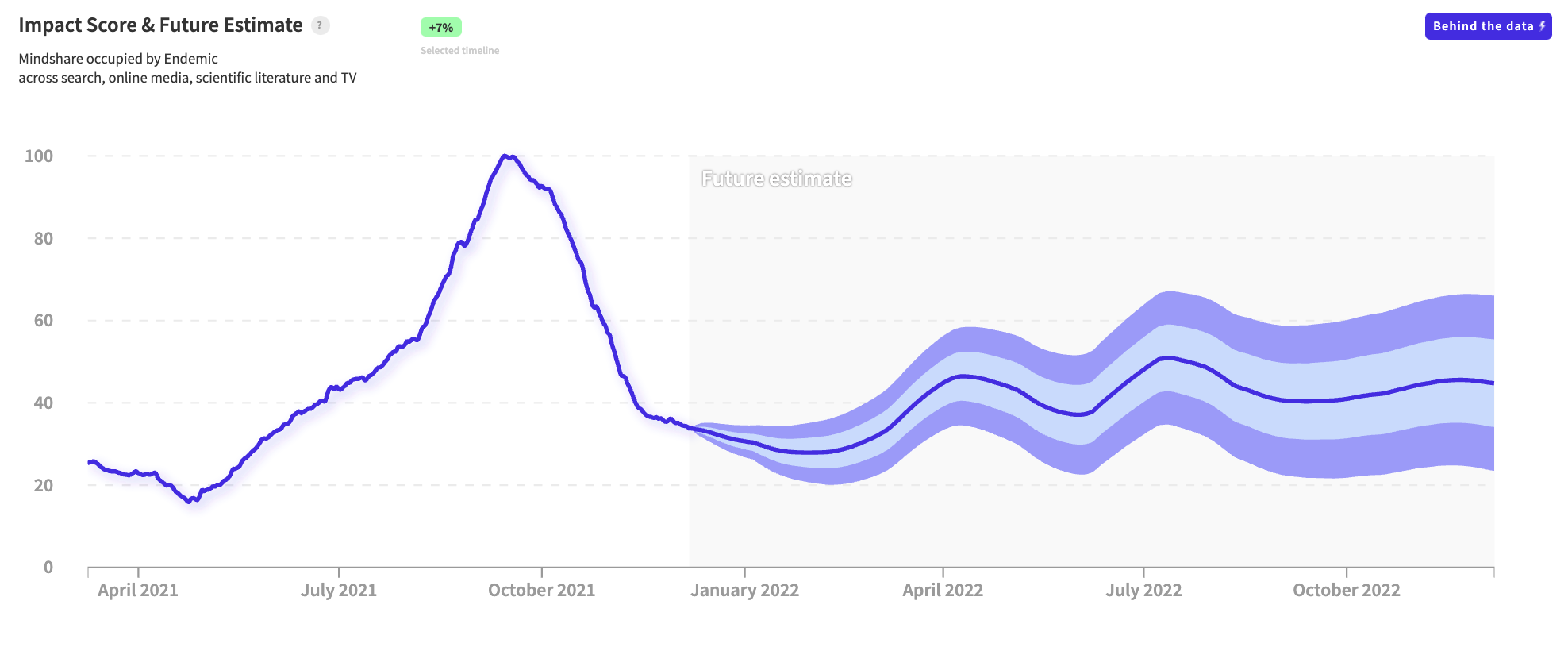
If there is one thing that is almost certain with COVID-19, it's that it will be here for the foreseeable future. The impact score for the epidemic is expected to grow in 2022, as COVID-19 is classified as an endemic vs. a pandemic.
5. Growing Border Conflicts
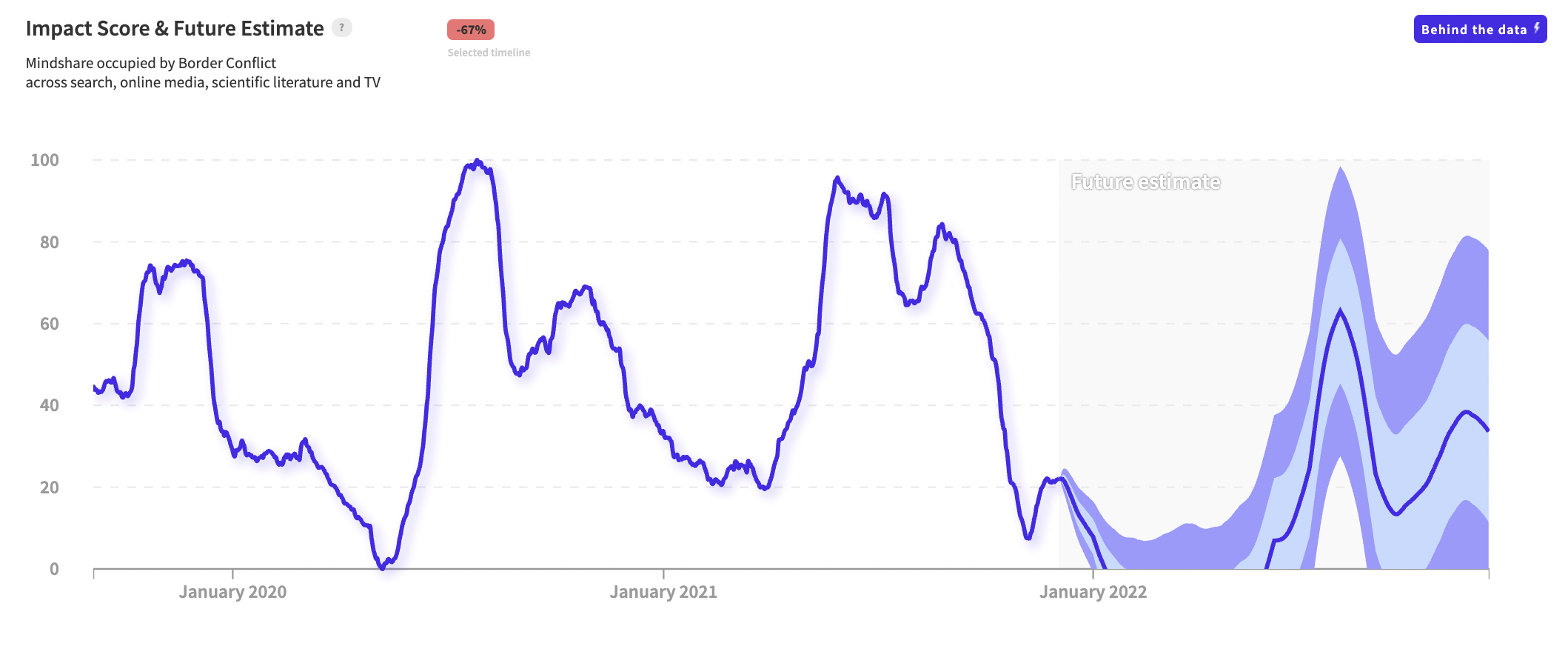
Between 2020 - 2021, a number of border tensions and conflicts emerged in Africa, Europe, and Asia. NWO.ai anticipates border tensions rising in some regions as regional powers grow and assert themselves.
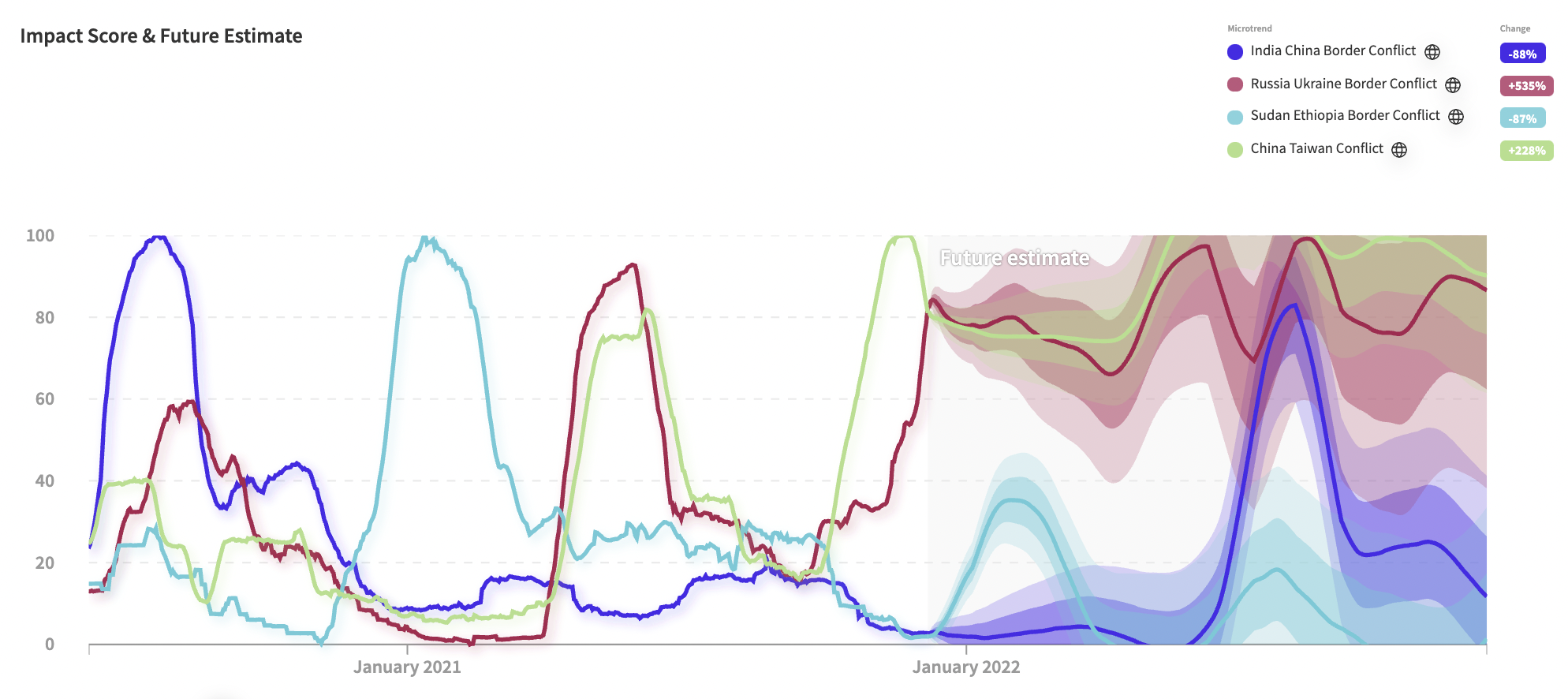
Recent border clashes between Ethiopia and Sudan have brought renewed attention to the region. The current question in Ethiopia is if the internal civil war between the Tigrays and the Ethiopian government will be contained inside its borders or spill out.
In 2020, China and India clashed in a series of skirmishes in Galwan Valley. NWO.ai has seen a spike in chatter around a renewed conflict, with the impact score expected to grow into 2022.
In 2021, the narrative between Taiwan and China has increasingly become more hostile. China has emerged more powerful than ever out of the pandemic, so it may feel emboldened to push the limits on Taiwan. The chatter around the "China Taiwan Conflict" is expected to continue to grow into 2022. The most recent border conflict that has exploded in conversation is between Russia and Ukraine. Russia has amassed an estimated 100,000 troops on Ukraine's border and has been moving artillery and equipment to the area. Since 2014, there has been a proxy war between Russian-backed forces and Ukraine in the Donbas region. Russia annexed Crimea from Ukraine as part of the conflict. The signal for a "Russia Ukraine conflict" is projected to grow moving into 2022.
6. Global Inflation

Inflation has risen worldwide, with the annual inflation rate in the United States hitting 6.8% in November. Economists are projecting inflation may continue to worsen before it gets better. In 2022, governments and central banks will go on the offensive to combat inflation and prevent long-term damage to their economies. NWO.ai's signal for inflation is detecting a growing impact score going into 2022.
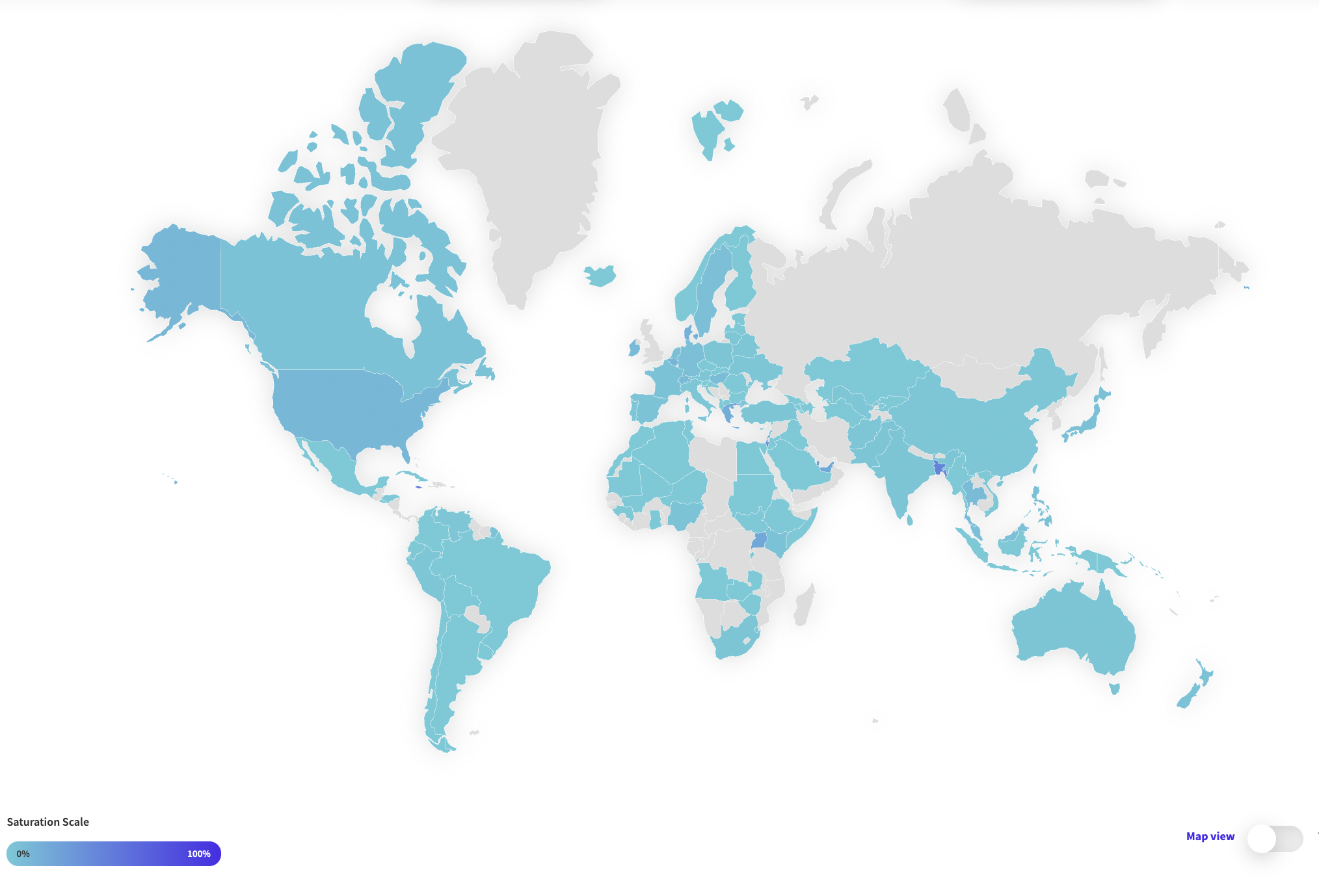
Looking at NWO.ai's location metrics, chatter around inflation has grown globally and the regional distribution seems to be fairly even. Global governments and central banks will be expected to take economic actions to cushion the blow rampant inflation may cause.
7. Deglobalization
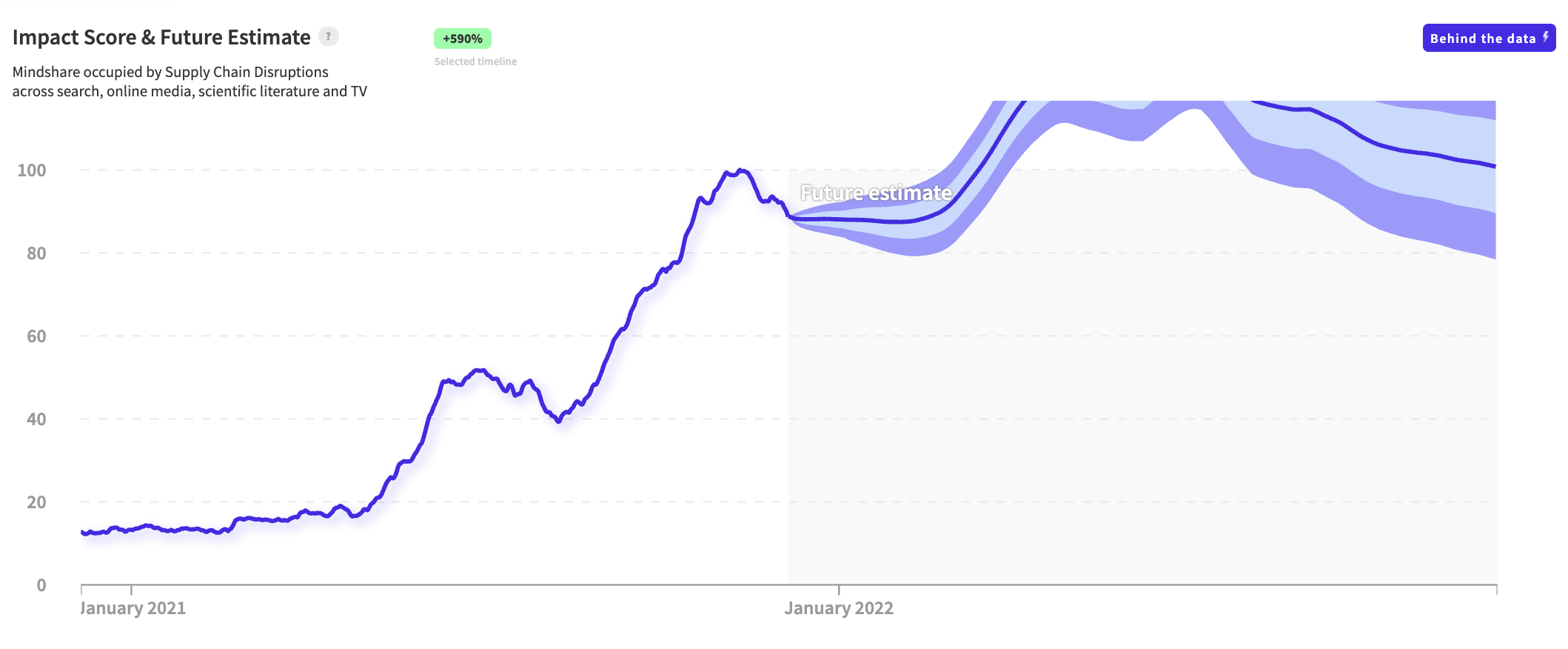
Since the beginning of the pandemic, global supply chains have experienced unprecedented disruptions. These disruptions have been further exacerbated by port and factory closures (further examined in another NWO.ai inflection point feature). NWO.ai's signal shows supply chain disruptions and slowdowns are expected to grow into 2022.
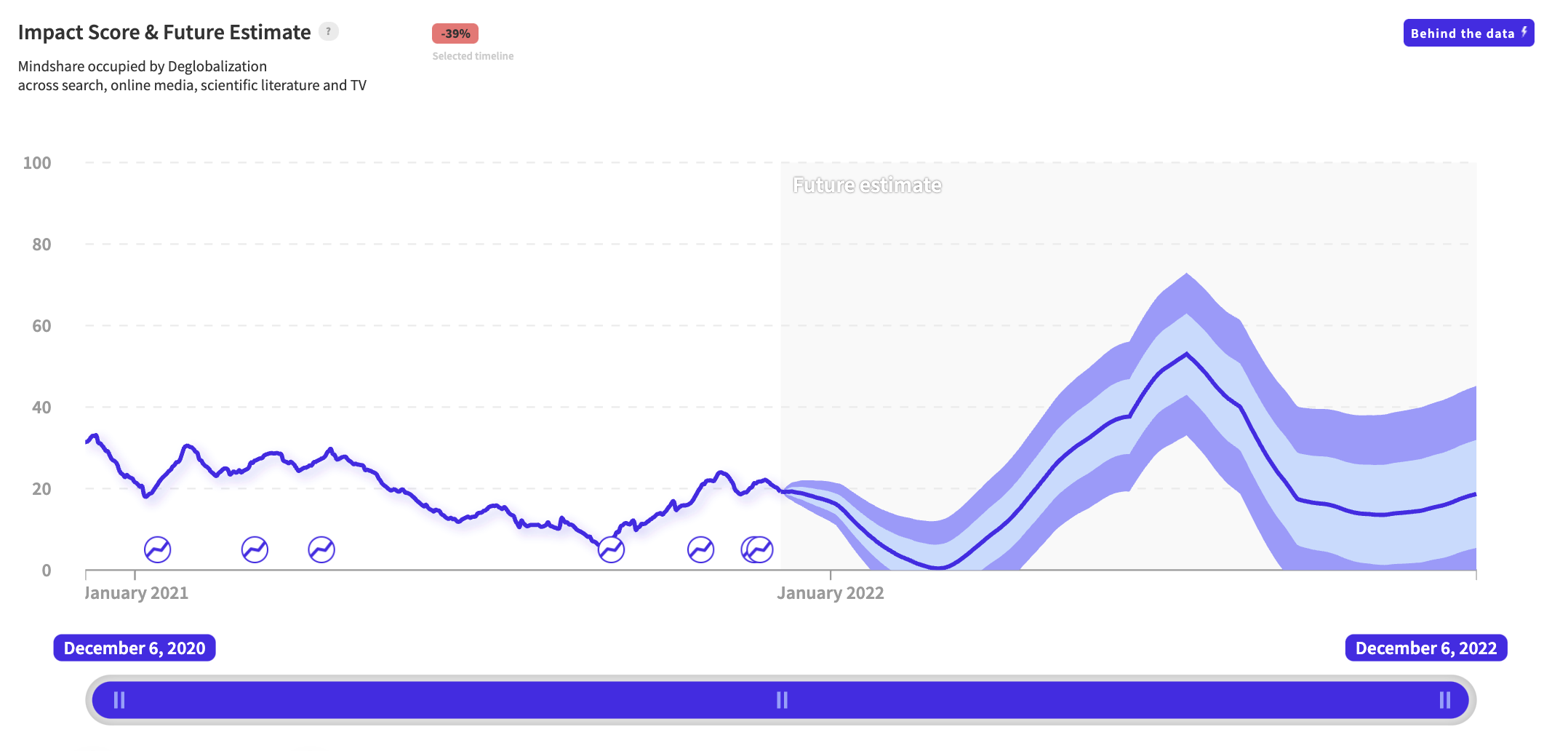
Supply chain disruptions have resulted in countries making their own supply chain resilience an interest of national security. As a result, the trend for deglobalization is projected to grow in 2022. Countries that have the capacity, will begin to look inward for the production of critical materials. For example, earlier this year President Biden issued an Executive Order on America's Supply Chains to declare that the "United States needs resilient, diverse, and secure supply chains to ensure [it's] economic prosperity and national security." Critical supply chains identified include semiconductor manufacturing, large-capacity batteries, critical minerals, and pharmaceuticals. The trend of trade liberalization, which has already been reversing, may continue to decline globally.
8. Crypto Regulation
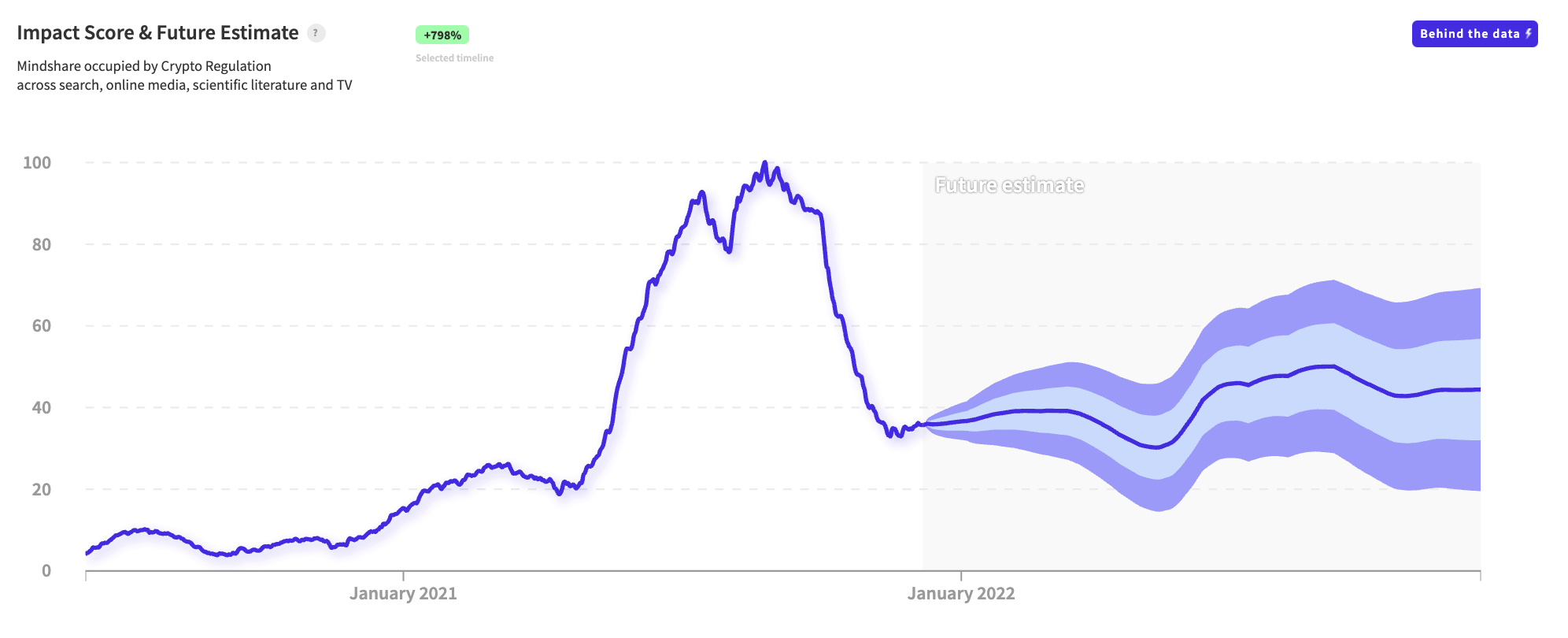
Interest in Crypto Currencies has risen sharply in 2021, as retail investors and large institutions pour into the space. Governments around the world are still attempting to grapple with Crypto Currencies and how they should treat the new asset class. El Salvador's President has embraced the new asset by giving bitcoin the status of legal tender. China has gone the opposite direction by banning crypto trading and mining entirely.
While either extreme is unlikely to take hold in most countries, lawmakers globally will be looking into regulating the space (the U.S. House Committee on Financial Services held hearings on the digital asset last week). NWO.ai's signal for "crypto regulation" is showing sustained momentum into 2022 and the usage of cryptocurrencies is only expected to grow.
9. China's Economic Reforms
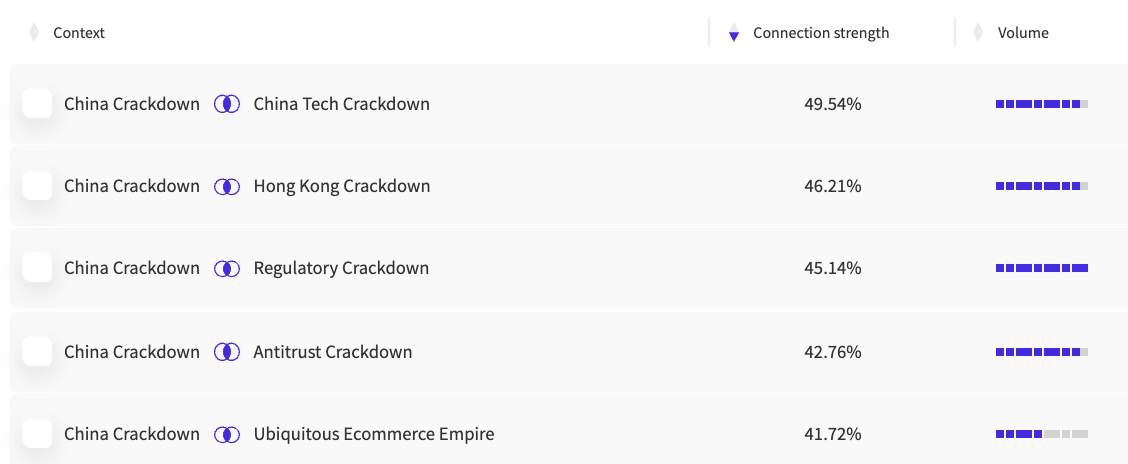
Over the past 2 years, China has undergone a series of trials, including dealing with the impacts of COVID-19, asserting its dominance over Hong Kong, combating international pressure of the treatment of Uighurs in Xinjiang, and cracking down on industries. Despite these challenges, China has shown that it's capable of dealing with short-term pain for long-term gain. China has emerged from the pandemic stronger than before and President Xi has proven, within China, to be capable of leading China over the next decade.
China is undergoing a 'Red New Deal', which describes the government’s recent economic reforms to crack down on speculative economic activity. Fintech, housing (we previously broke down how NWO.ai foretold of Evergrande's collapse), e-commerce and crypto industries have all experienced recent upheaval. In 2017, President Xi hinted at these reforms during the 19th party congress where he said "houses are for living in, not for speculation." NWO.ai's signal indicates that these economic crackdowns are expected to continue moving into 2022.
10. Energy Power Geopolitics
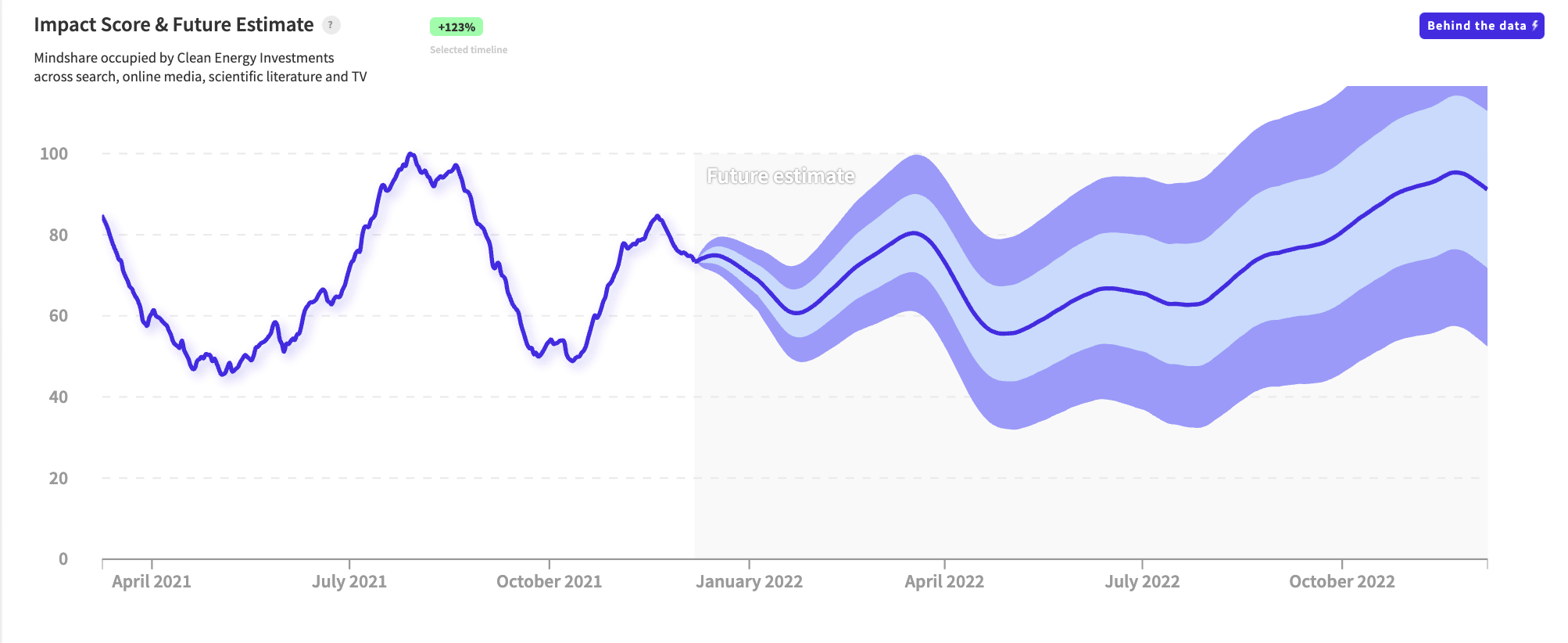
According to the IEA's Energy Investment 2021 report, global clean energy investment is expected to top $1.9 trillion dollars this year, and NWO.ai's forecast shows that the signal for clean energy investment is expected to continue growing into 2022.
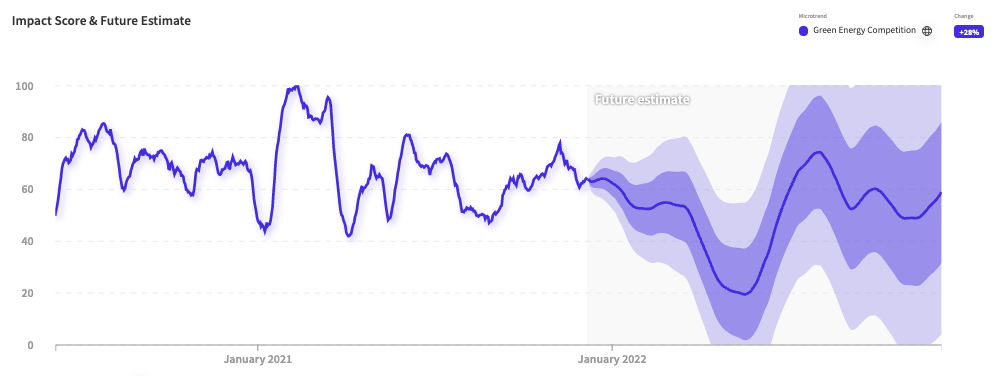
As Jason Bordoff and Meghan L. O'Sullivan's piece in Foreign Affairs argues, "clean energy will come to represent a new source of national power." While energy power centers’ shift away from the petro-states won't change overnight or even in the next decade (although Saudi Arabia is potentially investing in nuclear power plants), developing countries are expected to increase their fossil fuel consumption, creating an opportunity for new countries to become dominant players in the clean energy market. Some examples they lay out include the ability for countries to set standards for clean energy, dominance in the supply chain (e.g. rare earth minerals), and manufacturing components for clean energy technologies.
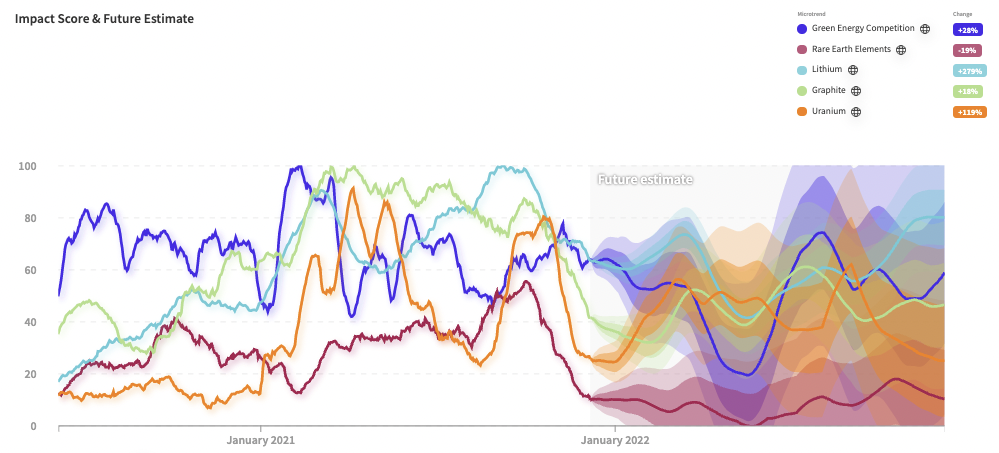
Over the last year, NWO.ai's platform has picked up substantial chatter around the minerals that power clean energy, with the signal for Lithium, Graphite and Uranium showing the most growth into 2022.
What's Next?
The world is entering a new era of geopolitics. The exponential age, a term coined by Azeem Azhar in his recent book, describes how "new technologies are being invented and scaled at an ever-faster pace" and impacting every facet of human society, including geopolitics. Governments will be forced to adapt and keep pace with rapid technological advancements, from Crypto Currencies and NFTs to new sources of energy and political crises that can be triggered by a single tweet.
Anticipating and preparing for every geopolitical risk is not feasible for companies, but having continuous monitoring of the top geopolitical risks and real-time insights into shifts in the narrative is critical. NWO.ai is poised to monitor and anticipate these trends and their impacts to give our customers an unprecedented advantage and window into possible futures.
About NWO.ai
NWO.ai's predictive platform enables leading Fortune 500 companies and government agencies to anticipate and track global cultural shifts by aggregating, analyzing, and producing actionable reports on human-generated data. We are leveraging petabytes of external, noisy, and unstructured data from various sources –including search, social media, blogs, news, patent databases, SEC filings and we are continuously adding more sources. Our mission is to answer the what, when, and most importantly, 'why' behind a consumer trend and enable our customers to detect these shifts as early as possible.
P.S. We're hiring! Check out our open positions and let us know if you'd be a good fit for our team. We're growing quickly and adding several engineering roles to help us decode the anatomy of next.
Thank you for reading. If you liked the piece, please help us spread the word and invite your friends to sign up here.